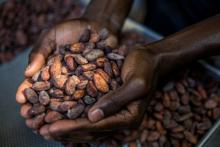From Bean To Bar, Haiti's Cocoa Wants International Recognition
What comes to mind when you think of Haitian agricultural products? Perhaps rum, coffee and mangos which, truth be told, are very good. Haiti also produces very high quality cocoa although, like every export crop, it is held back from realizing its full potential by political instability and weak infrastructure. However, there is room for growth as Haitian cocoa holds its own against any of its other Caribbean and Latin America neighbours. The FECANNO cooperative along employees 4,000 farmers in Northern Haiti producing high quality cocoa. The full article by AFP journalist Amelia Baron follows.









